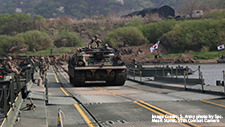Dangers in North Korean dual-track strategy
Niklas Swanström
North Korea would appear to have somewhat softened its confrontational stance in favor of a more constructive policy in recent weeks, a development which has seen the normalization of the Kaesong Industrial Complex, talks with Seoul on the issue of family reunions, and discussions initiated on reopening Mount Kumgang tourist resort. The impression is that Pyongyang is leaning toward greater engagement and interested in seeking out collaborative solutions, especially in the economic field where it is trying to boost investments.
Related Publications
-
South Korea’s Indo-Pacific Strategy, Atmanirbhar Bharat, and the IPEF: Convergence and Commonality
For some time now, the existing multilateral networks such as those of the United Nations (UN) system have been largely ineffective in providing good global governance and helping create resilience, […]
-
Risk Reduction and Crisis Management on the Korean Peninsula
The situation on the Korean Peninsula is inherently intertwined with the growing instability of the East Asian security environment, where high tensions significantly increase the risk of unintended incidents and armed […]
-
Disaster Risk Reduction: A Sustainable Path for Inter-Korea Cooperation
Introduction: Even in its current state of pandemic-induced isolation, North Korea continues to engage the international community on climate adaption and disaster risk reduction. South Korean President Moon Jae-in’s renewed […]
-
Chun In-bum on Seoul’s Security Policy Amid the Mounting North Korean Missile Threat
Mitch Shin interviews Chun In-bum on Seoul’s Security Policy Amid the Mounting North Korean Missile Threat.
-
Cross-Strait Relations: A Conflict in Slow Motion?
Abstract Xi Jinping’s much-anticipated centennial speech left little doubt that it remains “an unshakeable commitment” for the Chinese Communist Party (CCP) to resolve the Taiwan issue. With the global pandemic […]




